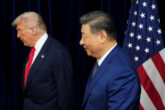June 22, 2018
The Lessons China Taught Itself: Why the Shanghai Cooperation Organization Matters
China’s changing political landscape and the recent accession of India to the Shanghai Cooperation Organization (SCO) marks the beginning of a new chapter for one of China’s first self-founded multilateral groupings. First established in June 2001 by China, Kazakhstan, Kyrgyzstan, Russia, Tajikistan, and Uzbekistan, the Shanghai Cooperation Organization’s initial activities were primarily focused on security, namely combatting the “three evils”—terrorism, separatism, and extremism (Shanghai Cooperation Organization, June 15 2001). This year’s leader-level summit marks the first instance in which Indian Prime Minister Modi will join the grouping as a full member, introducing a democratic counterweight into an organization historically dominated by China, and to a lesser degree, Russia.
Despite this unique constellation of actors, Western onlookers have frequently discounted the relevance and importance of the Shanghai Cooperation Organization (Council on Foreign Relations, October 14 2015). Highlighting internal dissent between China and Russia, few tangible outcomes, and an under-emphasis on strengthening economic partnerships, critics of the organization paint the grouping as ineffectual. Largely absent from previous outcome-focused Western analyses is a close look at the lessons that China itself has learned on advancing its geostrategic interests through multilateral organizations.
A review of the Shanghai Cooperation Organization’s activities reveals that China perceives the organization as a blank canvas to hone its own approaches to leading on the international stage. Chinese official newspapers and netizens have described the organization as a forum for China to explore and implement a new model of international relations. Moreover, official releases from the SCO itself acknowledge the need for the group to continue refining coordination and organization mechanisms, indicating that China’s strategy for engaging the organization is evolving as the SCO’s issue set expands in scope. Thus, the current value of the SCO is as a forum for China to define and articulate its interests, shape the focus of international institutions based on its own domestic priorities, lobby its neighbors to adopt its approach, and codify those views within an internationally legitimate multilateral process.
Read the Full Article at The Jamestown Foundation
More from CNAS
-
Chinese Maker of Bitcoin-Mining Machines Is a Security Threat, Says Expert
Bloomberg News reports that a Chinese manufacturer, Bitmain Technologies Ltd, that sells most of the world’s Bitcoin-mining machines — including 16,000 of them to a venture ba...
By David Feith
-
Indo-Pacific Security / Energy, Economics & Security
North Korea’s Provocations, Power Plays, and Shifting AlliancesTensions on the Korean Peninsula have reached a new and dangerous threshold. President Lee Jae Myung is warning of a real risk of accidental military clashes, as the situation...
By Dr. Go Myong-Hyun
-
Indo-Pacific Security / Energy, Economics & Security
How to Win the Economic War with ChinaTrump's approach to China has run aground, giving Beijing unprecedented advantage in the economic conflict....
By Edward Fishman & Julian Gewirtz
-
Indo-Pacific Security / Technology & National Security
Sharper: Tech + ChinaRecent talks between President Donald Trump and Chinese Communist Party General Secretary Xi Jinping placed a spotlight on emerging technologies, from high-end chips to minera...
By Charles Horn & Sevi Silvia




